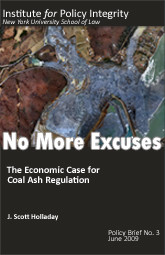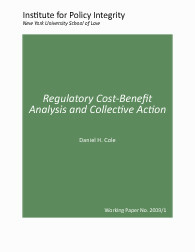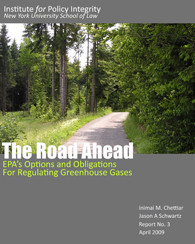-

No More Excuses
The Economic Case for Coal Ash Regulation
No More Excuses: The Economic Case for Coal Ash Regulation is a brief but careful analysis which reveals several compelling findings on the regulation of the toxic by-product of coal combustion. In broad strokes, it is clear that the benefits of regulating coal ash storage facilities would far outweigh the costs. The benefits of a regulation requiring coal ash to be stored in dry conditions and in synthetically-lined, covered facilities could save tens or even hundreds of millions of dollars per storage facility.
-

Regulatory Cost-Benefit Analysis and Collective Action
In Regulatory Cost-Benefit Analysis and Collective Action, Daniel H. Cole describes the influence of cost-benefit analysis and explains how and why it is a politically useful tools for agencies, even when those agencies are not required by law to prepare regulatory cost-benefit analyses (RCBA). As Cole says in his introduction, “For better or for worse, RCBAs have significantly influenced policies for dealing with, or not dealing with, collective action problems ranging from airport enlargement to global climate change.”
-
_110_170_90.jpg)
Federalism Accountability
“Agency Forcing” Measures
In Federalism Accountability: “Agency Forcing” Measures, author Catherine M. Sharkey advocates a variety of “agency-forcing” measures designed to enhance the ability of Congress, the executive, and especially the courts to ensure that agencies abide by executive mandates and other reforms, and to provide a check on overt politicization or inaction on agencies’ part.
-
Request for cost-benefit analysis of Waxman-Markey bill
During the congressional debate over the climate legislation proposed by Reps. Waxman and Markey, the EPA published several costs estimates for the bill. But the agency was never asked to estimate the corresponding benefits.
-
Comments on New York state electricity subsidies
New York State subsidizes the electricity bills for some companies as a way of encouraging them to keep their business here.
-
Letter in support of the Cap and Dividend Act
Policy Integrity released a letter of support for HR 1862. This bill, known as the Cap and Dividend Act of 2009, proposes a system of curbing greenhouse gas emissions that auctions carbon allowances and refunds the proceeds to American households.
-

The Road Ahead
EPA’s Options and Obligations for Regulating Greenhouse Gases
This detailed legal analysis provides an in-depth and thorough discussion of greenhouse gas regulation under the Clean Air Act answering the questions: What are EPA’s obligations under the Clean Air Act, and how far can and should the agency go to regulate greenhouse gases?
-
Comments against draft oil drilling plan
Within weeks of Congress allowing longstanding offshore drilling bans to lapse, oil prices took a nose dive, which quieted the calls to “drill here, drill now.” However, before leaving office, the Bush Administration released a draft drilling plan that is being taken up by the Obama Administration.
-
Motion for leave against hazardous truck driver rules
In November 2008, just weeks before President Obama took office, the Bush Administration finalized a rule increasing the amount of time truck drivers can spend behind the wheel—creating a possible public health and safety hazard. The rule allows truck drivers to drive for 11 hours, one more hour than they were allowed before 2003, and allows them to drive as many as 77 hours in seven days or 88 hours in eight days, over 25 percent more than previously allowed by federal law.
-
Policy Integrity’s recommendations incorporated into EECA report
Today, Policy Integrity received favorable feedback on comments we submitted on draft EPA Guidelines for Preparing Economic Analyses supporting positive changes made in the new draft and suggest additional improvements. The document has been an influential resource for EPA’s consideration of regulatory costs and benefits.
